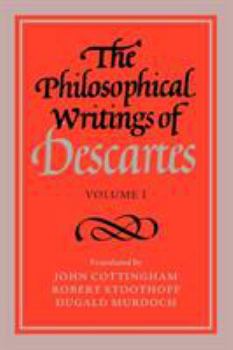The Philosophical Writings of Descartes: Volume 1
Select Format
Select Condition 
Book Overview
These two 1985 volumes provide a translation of the philosophical works of Descartes, based on the best available Latin and French texts. They are intended to replace the only reasonably comprehensive... This description may be from another edition of this product.
Format:Paperback
Language:English
ISBN:052128807X
ISBN13:9780521288071
Release Date:May 2011
Publisher:Cambridge University Press
Length:434 Pages
Weight:1.36 lbs.
Dimensions:1.2" x 6.0" x 8.9"
Customer Reviews
3 ratings
Descartes
Published by Thriftbooks.com User , 14 years ago
This books was required for one of my daughter's college courses. It met her needs so I was delighted.
A rationalist approach to controlling human passions
Published by Thriftbooks.com User , 14 years ago
I read Descartes The Passions of the Soul from the Philosophical Works Of Descartes, translated by John Cottingham, Robert Stoothhoff, Dugald Murdoch, for a graduate class in ethics. This is the best translation of several I examined. I was particularly interested in studying Descartes' understanding of the virtue of courage. It is fitting that Descartes left the discipline of moral philosophy as his last project, considering years earlier, in his Principles of Philosophy, he metaphorically explains the whole order of philosophy by using a tree as his example. "The roots are metaphysics, the trunk is physics, and the branches emerging from the trunk are all the other sciences, which may be reduced to three principal ones, namely medicine, mechanics and morals." (Principles of Philosophy, vol. 1 of The Philosophical Works Of Descartes, 186, (AT IXB, 14). Descartes' correspondence with Princess Elizabeth of Bohemia produces the first fruit of his ethical theory when she asked him questions about how the "passions" (emotions) are ruled by either the "soul" (mind) or the body considering they are separate entities. Descartes' answer to the Princess was, that the body causes the soul to have feelings and passions, and the soul causes the body to move, through an inexplicable `union' between the soul and the body. After a year of correspondence in which she received more than a few obtuse answers from Descartes, she asked him to provide a definition of the passions so that they could be easily understood. With this mission before him, Descartes in The Passions of the Soul published in 1649, makes a rational study of people's ethical behavior, relying on physiological as well as psychological explanations regarding the interplay between the body mind and emotive passionate forces that take place within people beings and cause their actions. In Descartes' first paragraph in his Passions, he challenges the wisdom of classical Greek notions of how people's passions influence ethics. "...the teachings of the ancients about the passions are so meager and for the most part so implausible that I cannot hope to approach the truth except by departing from the paths they have followed. That is why I shall be obliged to write just as if I were considering a topic that no one had dealt with before me." (The Passions of the Soul (AT XI, 327-328). Descartes divides his treatise on the Passions into three parts. Part I examines the mind and body relationship in physiological terminology, part II is a general classification of the passions and their functions, and part III makes a psychoanalytical study of individual passions. However, when one reads Descartes' ethical writing, one finds that he is not a tabula rasa. There is a Stoic influence to Descartes' ethical project the overriding aim of the Passions is to inform the reader on how to master the passions so that they will be an indispensable resource for the will in determining right action. I
Valuable Collection for specialists and non-specialists.
Published by Thriftbooks.com User , 15 years ago
This "new" (1985) translation by Cottingham, Stoothoff, and Murdoch is a valuable addition to the library of anyone interested in the history of philosophy, early modern thought, or the history of the subject. I've never been the biggest fan of Descartes' philosophies, but CSM do a wonderful job of compiling his philosophical works into 2 volumes. It is hard to overestimate the importance of Descartes' thought, and this has some of his key works, including the famous "Discourse on the Method." It also has some really interesting texts with which I was not familiar: the "Rules for the Direction of the Mind" and "Principles of Philosophy." My personal favorite of Descartes, "Meditations on First Philosophy," appears in Volume 2, which I have recently ordered. CSM's translations are quite readable, and while I wish they had more critical work (very few explanatory footnotes, and the prefaces are concerned solely with textual history), I can understand why they left it out -- they are tackling a big enough subject without going to the effort to try to compile footnotes. Buyers should take the title very seriously -- this is only the PHILOSOPHICAL writings of Descartes, with only a smattering of his scientific and mathematical texts. I believe that there is still no complete translation of all of Descartes works into English, but from what you can get out this and the 2 other volumes by CSM (vol. 3 has correspondence), you can become extremely well versed in Rene's work. Only those people who devote their entire academic careers to Descartes and French philosophy need look at the 13-volume complete works in French, which is the way such people should read it anyway. This is suitable for, I think, even the serious philosopher.




